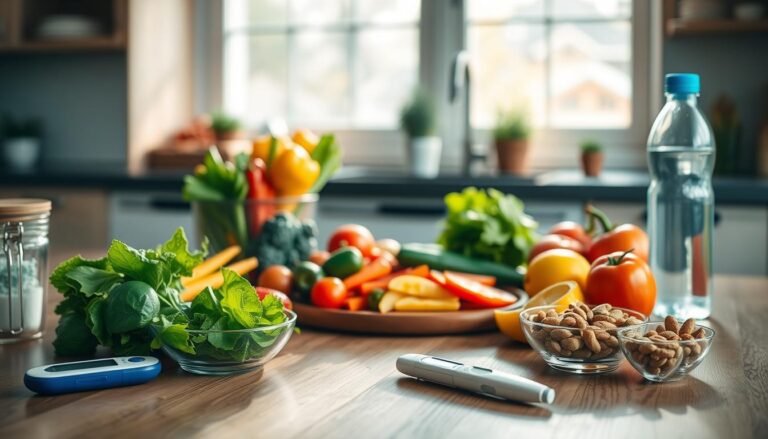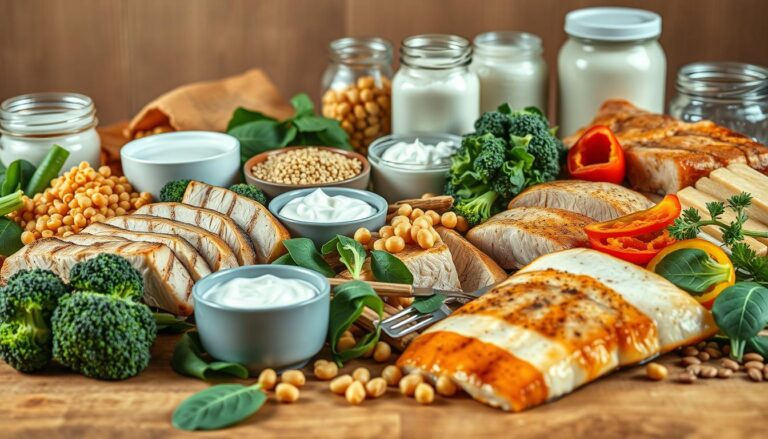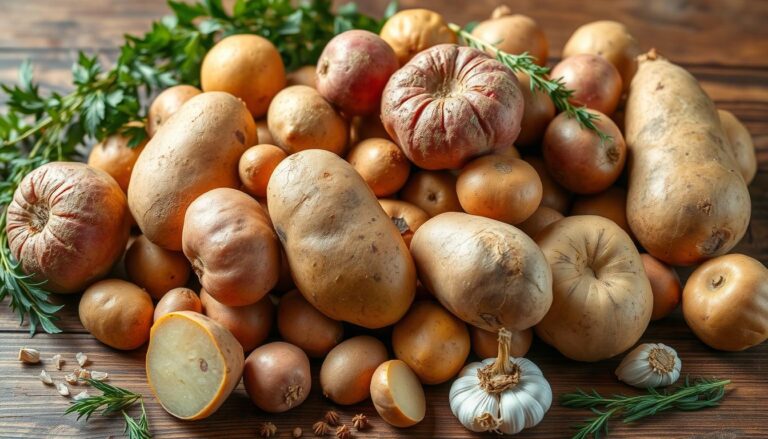Are you tired of feeling bloated? You’re not alone. Bloating is a common problem that can be caused by many things.
This includes gas indigestion and constipation. But, there are foods and drinks that can help make you feel better.
In this article, we’ll look at 11 foods and drinks that can fight bloating. We’ll talk about foods high in fiber and probiotics. We’ll also cover natural ingredients that fight inflammation. These can help reduce stomach swelling and keep your gut healthy.
Key Takeaways
- Certain foods and drinks can help alleviate bloating by promoting regularity, preventing fluid retention, and enhancing gut health.
- Fiber-rich foods, probiotic-rich options, and natural anti-inflammatory ingredients are among the most effective remedies for reducing bloating.
- Potassium-rich foods can help balance water levels and reduce water retention, while natural digestive aids and herbs can aid in digestion and gas expulsion.
- Fruits and vegetables with prebiotic and water-rich properties can also be beneficial for combating bloating.
- Fermented foods and proper hydration are also important for maintaining a healthy digestive system and reducing bloating.
Understanding Bloating Causes and Effects
Bloating is a common problem that many people face. It can cause discomfort like swelling in the belly and too much gas. While it’s okay to feel bloated sometimes, it can be a sign of a bigger health issue if it happens a lot or is very bad.
Common Triggers of Bloating
Many things can make bloating worse. Here are some common ones:
- Drinking carbonated drinks can add extra air to your belly
- Some foods like legumes, cruciferous veggies, and dairy can be hard to digest
- Eating too much or too fast can make you swallow more air
- Medical issues like IBS, SIBO, or gastroparesis can also cause bloating
How Bloating Affects Digestive Health
Bloating can really mess with your digestive system. It can make your belly hurt, feel too full, and even look bigger. In bad cases, it can cause pain, cramps, and even block your bowel. Long-term bloating might mean you have a serious problem like inflammatory bowel disease or gynecological issues.
Signs and Symptoms of Bloating
The main signs of bloating are:
- Swelling or distension in the belly
- Feeling very full or tight in the stomach
- Too much gas or farting
- Pain or discomfort in the belly
- Hard time with bowel movements
Knowing what causes bloating is the first step to fixing it. By finding and fixing the root causes, you can lessen bloating and boost your digestive health.

The Role of Nutrition in Reducing Bloat
Proper nutrition is key to managing and reducing bloating. Eating foods high in fiber, probiotics, and staying hydrated helps tackle bloating’s causes. It also boosts your digestive health.
Fiber-Rich Foods: Foods like quinoa, oatmeal, and apples are great for regular bowel movements. They prevent constipation, a bloating trigger. Quinoa has almost double the fiber of most grains, and oatmeal is full of soluble fiber.
Probiotic Rich Options: Adding foods like yogurt, kefir, kimchi, and sauerkraut to your diet is beneficial. They nourish good bacteria in your gut, aiding digestion and possibly reducing bloating.
Hydration and Water-Rich Foods: Drinking enough water is vital for avoiding water retention and aiding digestion. Foods like watermelon, cucumbers, and green tea are also hydrating. Watermelon is mostly water, and green tea helps with digestion.
Proper nutrition is key in managing and reducing bloating. By focusing on fiber rich, probiotic-rich, and hydrating foods, you can effectively address the root causes of bloating and support overall digestive health.
By adding these nutritional tips to your daily life, you can actively fight bloating. This improves your digestive health too.
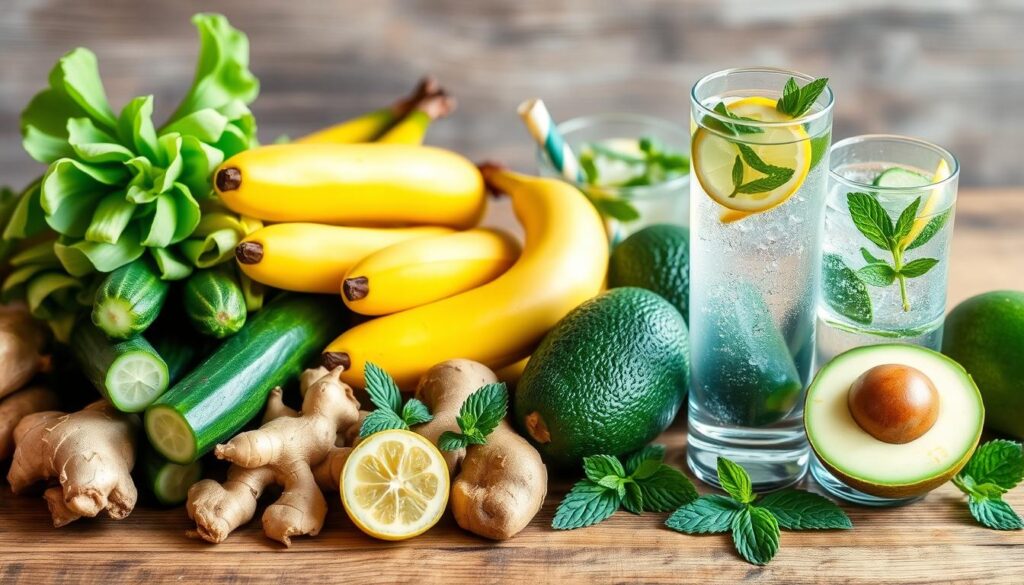
11 Foods and Drinks That Help with Bloating
Do you often feel bloated? Good news: some foods and drinks can help. Adding fiber rich, probiotic-rich, and anti-inflammatory foods to your diet can ease bloating. This can make you feel better and more comfortable.
Fiber Rich Foods
High-fiber foods can change your bloating game. Avocados, bananas, and oats are full of soluble fiber. They help with digestion and prevent gas. A study from Monash University in Melbourne, Australia, suggests eating no more than a small part of an avocado daily to avoid bloating.
Probiotic Rich Options
Probiotics are good bacteria in our gut. They’re key to a healthy digestive system. Foods like kombucha, kimchi, and sauerkraut are packed with probiotics. They help digest food better and reduce bloating.
Natural Anti-Inflammatory Foods
Some foods fight inflammation in the gut, which helps with bloating. Ginger, turmeric, berries, and leafy greens are great for this. Adding these to your diet can ease bloating and boost your digestive health.

Choosing the right foods can help manage bloating. Focus on fiber-rich, probiotic-rich, and anti-inflammatory foods. This can improve your digestion and overall health.
Potassium Rich Foods for Water Balance
Keeping a healthy balance of electrolytes is key to avoiding fluid retention and bloating. Foods rich in potassium help manage fluid levels and sodium balance. This is important because sodium can cause stomach swelling.
Bananas are a great source of potassium, with about 422 milligrams in a medium fruit. Avocados also pack a lot of potassium, with around 485 milligrams per cup. Eating these foods can help keep your body’s fluid balance right and cut down on water retention.
- Bananas are high in fiber, potassium, vitamin C, and magnesium, making them a good choice for people experiencing bloating or diarrhea.
- Avocados contain monounsaturated fat, fiber, folate, vitamin K, and potassium, but those reducing their FODMAP intake should limit consumption to one-eighth of an avocado per day.
- Oatmeal is a fiber-rich, low-FODMAP, and moderately low-glycemic food that can help combat inflammation and bloating.
- Oranges are full of fiber, vitamin C, potassium, and have a high water content, making them a low-FODMAP, low-glycemic option.
Eating these potassium-rich foods is important for a healthy electrolyte balance. It helps prevent fluid retention and reduces bloating.
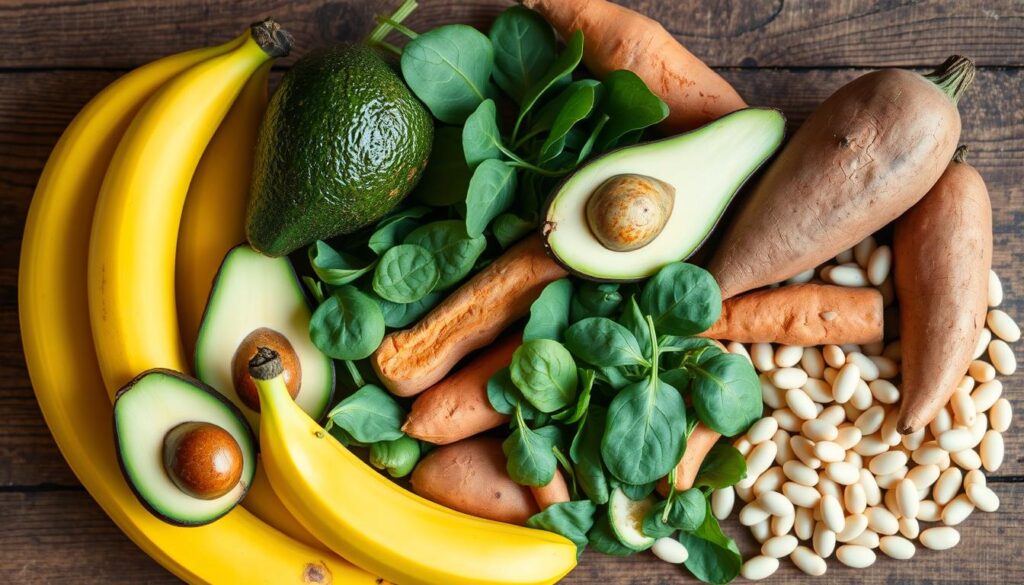
Participating women who ate a banana before each meal ultimately felt less bloated than those who didn’t, according to research published in Anaerobe.
Natural Digestive Aids and Herbs
Natural remedies can be very effective against bloating. Ginger and turmeric are two strong allies against digestive discomfort.
Ginger and Turmeric Benefits
Ginger is known for its anti-inflammatory properties. It helps speed up stomach emptying and reduces bloating. A 2019 review found ginger helps prevent stomach issues like bloating and flatulence.
Turmeric contains curcumin, a powerful anti-inflammatory. Curcumin improves gut health and eases IBS symptoms, which often cause bloating.
Herbal Tea Solutions
Drinking certain herbal teas can soothe digestive issues and reduce bloating. Peppermint and chamomile teas calm the stomach. A 2022 study showed a mix of caraway and peppermint oils in FDgard eased stomach pain.
Adding these natural digestive enzymes and herbs to your routine can tackle bloating’s causes. This promotes a healthier, happier gut.
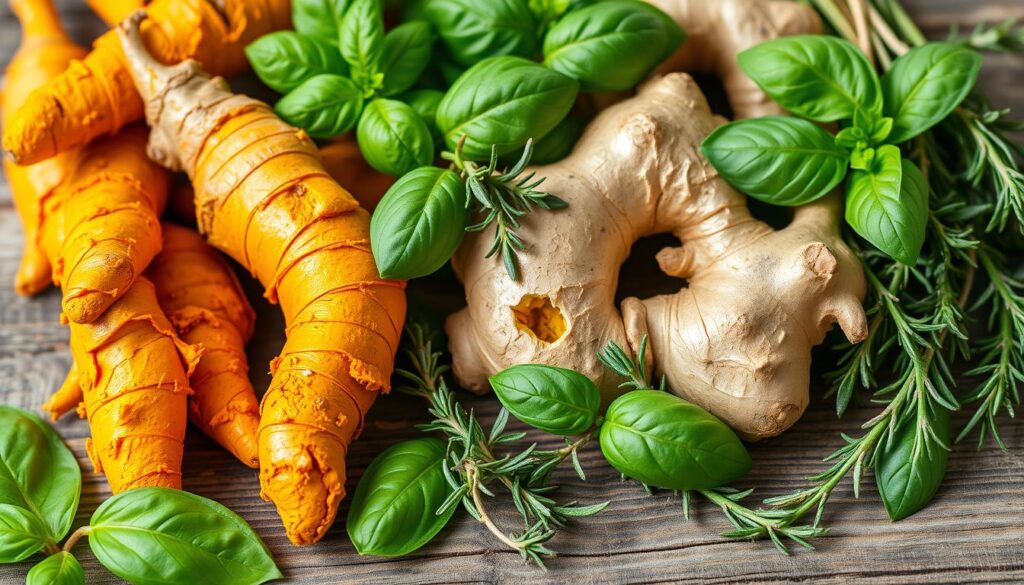
Fruits That Combat Bloating
Bloating can be really annoying and uncomfortable. But, some fruits can help make these feelings go away. Fruits like pineapple, papaya, and kiwi have enzymes that help with digestion and reduce bloating.
Pineapple is a great example. It has bromelain, an enzyme that breaks down proteins and improves digestion. Papaya has papain, a natural digestive enzyme. And kiwi is full of actinidin, which helps digest proteins too.
These fruits are not just good for digestion. They also have lots of antioxidants and digestive enzymes. Eating these fruits can be a tasty way to fight bloating.
Pineapple, papaya, and kiwi are all excellent choices for fighting bloat due to their natural digestive enzymes.
- Bananas: Rich in potassium and resistant starch, which can help regulate sodium levels and prevent water retention.
- Avocados: High in fiber and healthy fats that can improve digestion and nutrient absorption.
- Lemons: The citric acid in lemon juice can help stimulate digestive juices and reduce bloating.
Eating these antioxidant– and digestive enzyme-rich fruits can help manage bloating. It’s a natural way to keep your digestive system healthy.
Vegetables That Reduce Stomach Swelling
Adding certain vegetables to your meals can help fight bloating and reduce stomach swelling. These veggies are not just good for you they also help with digestion and comfort.
Prebiotic Rich Options
Asparagus and artichokes are full of prebiotics. These are fibers that feed the good bacteria in your gut. They help keep your gut healthy, which can reduce bloating.
Water-Rich Vegetables
Drinking enough water is crucial for avoiding bloating. Vegetables like celery and cucumber are very watery. They help with hydration and prevent water buildup. Plus, they don’t cause much digestive trouble.
Remember, everyone reacts differently to food. Some people might not do well with certain veggies. Listen to how your body feels to find the best veggies for you.
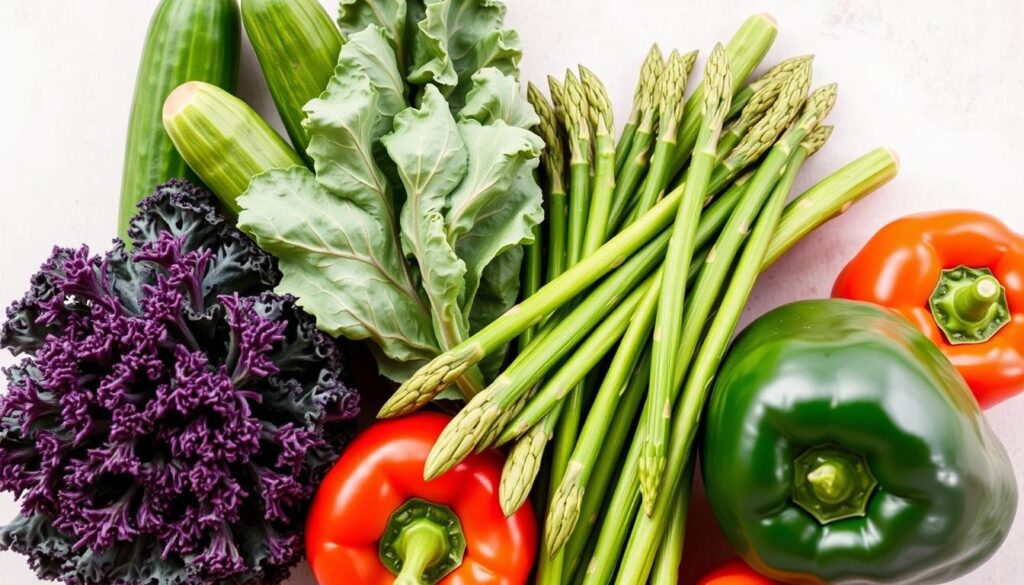
Incorporating a variety of fiber-rich, water-dense, and prebiotic-containing vegetables into your diet can be a powerful way to combat bloating and promote better digestive function.
Fermented Foods and Their Benefits
Fermented foods like yogurt, kefir, and kombucha are getting more attention for their health benefits. They are full of probiotics, which help keep your gut microbiome healthy. Eating these foods can make digestion better, reduce bloating, and help with irritable bowel syndrome IBS.
Kefir, a fermented milk drink, is packed with different microbes. It might help control blood sugar in type 2 diabetes, improve gut health, aid in weight loss, and lower inflammation. Kimchi, a Korean fermented vegetable dish, can also lower cholesterol, improve blood sugar, and boost gut and brain health.
Kombucha, a fizzy fermented tea, supports a diverse gut microbiome in animal studies. It may also have anti-inflammatory effects, improve heart health, and help with neurodegenerative diseases.
Sauerkraut, a fermented cabbage dish, can ease IBS symptoms and lower cholesterol. It’s also a good source of fiber, vitamins C and B6, and iron. Yogurt, a well-known fermented food, is linked to better gut, heart health, and lower risks of certain cancers and type 2 diabetes.
Other fermented foods like miso, certain cheeses, sourdough bread, and apple cider vinegar also support gut health. There are many ways to add these probiotic-rich foods to your diet.
However, some people might experience gas or bloating when eating more fermented foods. It’s important to start slowly and listen to your body. Finding the right balance is key.
Fermented foods have been part of many cuisines for centuries. Their popularity has grown because they support a healthy gut microbiome. From dairy to vegetables, grains, and even meat and seafood, fermentation makes foods more nutritious and easier to digest. Adding a variety of fermented foods to your diet can lead to better digestion, less bloating, and overall gut health.
Hydration and Beverages for Digestive Health
Drinking enough water is key for a healthy digestive system and avoiding bloating. Water makes up a big part of the digestive tract’s cells, helping it work right. It also helps food move through and stops constipation. Drinking a glass of water with each meal is a good rule.
Some herbal teas can also help with digestion and reduce bloating. Peppermint tea, for example, has been used for thousands of years. It may help ease gut spasms. Fennel tea is full of fiber and can help with constipation and other digestive issues.
But, drinks like carbonated ones and caffeinated beverages can cause problems. Caffeine can make digestion work harder, leading to heartburn and discomfort. It’s best to limit coffee or tea to 1 or 2 cups a day.
| Beverage | Potential Benefits for Digestive Health | Potential Drawbacks |
|---|---|---|
| Water | Promotes proper digestion and prevents constipation | None, as long as it is consumed in moderation |
| Peppermint Tea | May help reduce spasms in the gut | None, as long as it is consumed in moderation |
| Fennel Tea | Packed with fiber, may help relieve constipation | None, as long as it is consumed in moderation |
| Coffee | Can act as a digestive stimulant | May cause heartburn and other digestive issues in excess |
| Carbonated Beverages | None | Can contribute to gas and bloating |
By focusing on proper hydration and choosing the right beverages, you can support your digestive health and alleviate issues like bloating. Remember to listen to your body and keep a food diary to identify any trigger foods or drinks that may be causing your digestive discomfort.
Conclusion
Adding these 11 foods and drinks to your diet can help with bloating. It also improves your digestive health. Along with regular exercise and stress management, a diet full of these options can make you feel better.
Bloating is common and can affect anyone. But, changing your eating habits and using these natural remedies can help a lot. A balanced diet, staying hydrated, and managing stress are key to avoiding bloating.
Focus on your digestive health and choose the right foods and drinks. This way, you can take care of your gut. Start using these tips and enjoy a happier, less-bloated life.



